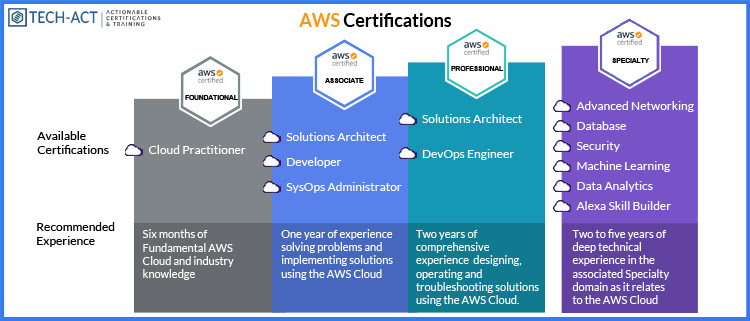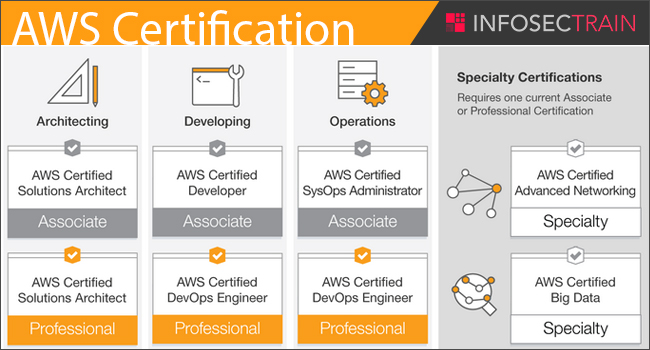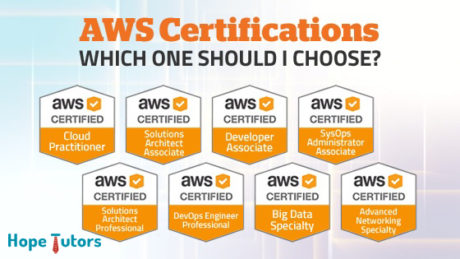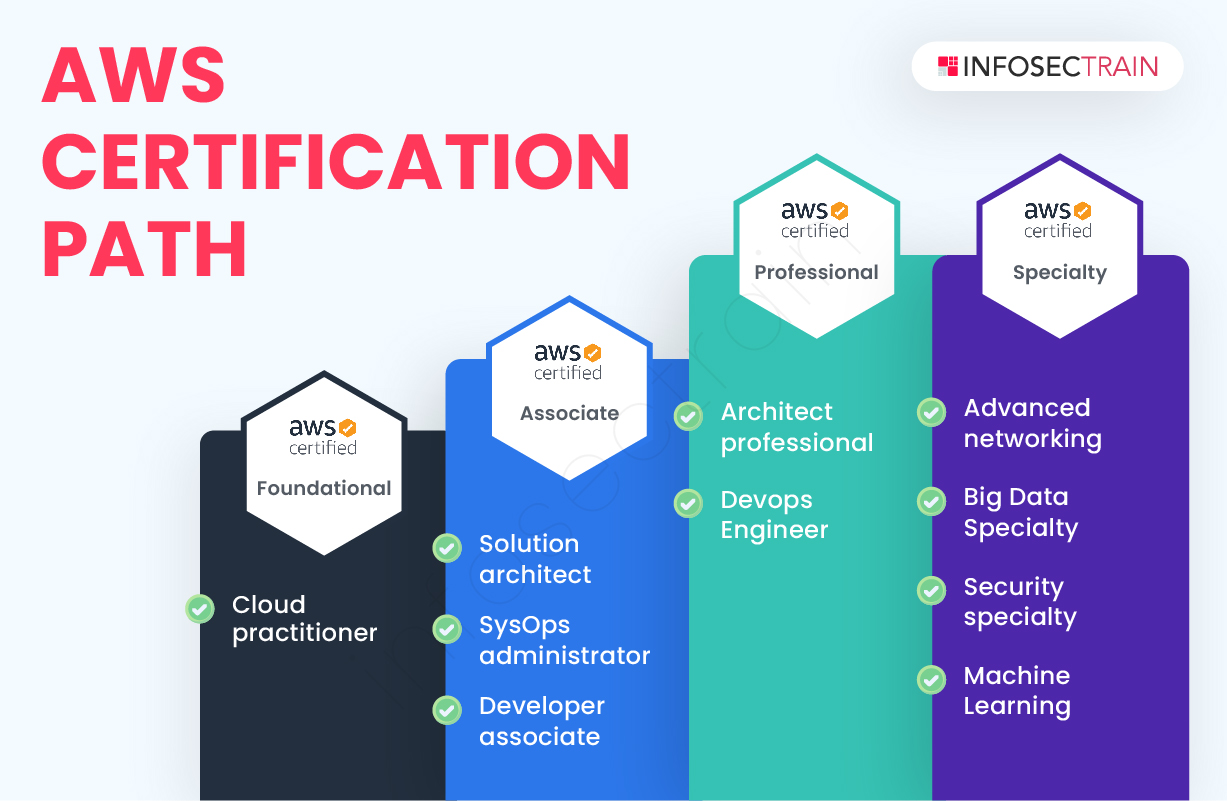Unlocking the Power of AWS Certifications
In the rapidly evolving world of cloud computing, the demand for skilled and certified professionals has never been higher. AWS (Amazon Web Services) certifications have emerged as the gold standard for validating expertise in the AWS ecosystem, offering a clear path for individuals to showcase their proficiency in a wide range of AWS services and technologies. These certifications not only validate your knowledge but also open doors to exciting career opportunities, enhanced earning potential, and recognition within the industry. As the cloud computing landscape continues to expand, AWS certifications have become increasingly valuable, serving as a testament to your ability to design, deploy, and manage robust and scalable cloud-based solutions. By earning an AWS certification, you demonstrate your commitment to professional development, your deep understanding of AWS best practices, and your capacity to tackle complex cloud-related challenges.
Whether you’re a seasoned IT professional looking to specialize in AWS or an aspiring cloud engineer seeking to kickstart your career, obtaining the right AWS certification can be a game-changer. By aligning your certification goals with your career aspirations and current skill level, you can unlock a world of opportunities and position yourself as a sought-after AWS expert.
Exploring the AWS Certification Tiers
The AWS certification landscape is structured into a tiered system, each level catering to different skill sets and career stages. Understanding the various certification tiers can help you navigate the path that aligns best with your professional goals and current expertise. The Foundational tier, represented by the AWS Certified Cloud Practitioner certification, is designed for individuals who are new to the cloud computing industry or those seeking to gain a broad understanding of the AWS platform. This entry-level certification covers the fundamental AWS services, architecture, and pricing models, making it an excellent starting point for those embarking on their AWS journey.
The Associate tier, which includes certifications such as the AWS Certified Solutions Architect – Associate, AWS Certified Developer – Associate, and AWS Certified SysOps Administrator – Associate, is geared towards individuals who have hands-on experience in designing, developing, and operating AWS-based solutions. These certifications validate your ability to implement and manage robust, scalable, and secure cloud infrastructures.
The Professional tier, comprising the AWS Certified Solutions Architect – Professional and AWS Certified DevOps Engineer – Professional, is aimed at seasoned cloud practitioners who have extensive experience in architecting and deploying complex, enterprise-level AWS solutions. These certifications demonstrate your expertise in optimizing cost, performance, and security across the AWS ecosystem.
Lastly, the Specialty tier offers certifications that focus on specific AWS services or domains, such as the AWS Certified Data Analytics – Specialty, AWS Certified Security – Specialty, and AWS Certified Machine Learning – Specialty. These certifications allow you to showcase your deep-dive expertise in specialized areas of the AWS cloud, catering to the needs of organizations seeking highly specialized talent.
By understanding the different AWS certification tiers and their respective focus areas, you can make an informed decision on the certification that best aligns with your current skills, career aspirations, and the specific AWS services or domains you wish to specialize in.
Choosing the Right AWS Certification for Your Goals
Navigating the extensive list of AWS certifications can be a daunting task, but aligning your certification goals with your career aspirations and current skill level is crucial for maximizing the impact of your efforts. By carefully considering the following factors, you can identify the AWS certification that best suits your professional development needs. Current Skill Level: Assess your existing knowledge and hands-on experience with AWS services and technologies. This will help you determine the appropriate certification tier, whether it’s the Foundational, Associate, Professional, or Specialty level, that will challenge you while building upon your existing expertise.
Career Aspirations: Reflect on your long-term career goals and the specific roles or responsibilities you aspire to. This will guide you in selecting the AWS certification that will validate the skills and knowledge required for those roles, such as solutions architect, developer, or DevOps engineer.
Specialized AWS Services: If you have a particular interest or expertise in specific AWS services, such as data analytics, security, or machine learning, consider pursuing a Specialty-level certification that will showcase your deep-dive knowledge in those domains.
Industry Relevance: Research the AWS certifications that are in high demand within your industry or the organizations you wish to work for. Aligning your certification choices with the needs of your target employers can significantly enhance your career prospects.
Certification Roadmap: Develop a comprehensive certification roadmap that outlines your short-term and long-term goals. This will help you plan your certification journey, ensuring that you build a well-rounded portfolio of AWS credentials that demonstrate your versatility and commitment to professional development.
By carefully evaluating these factors, you can make an informed decision on the AWS certification that will not only validate your expertise but also open doors to exciting career opportunities and position you as a sought-after AWS professional.
Preparing for AWS Certification Exams
Earning an AWS certification requires a well-structured and comprehensive preparation plan. Whether you’re aiming for an entry-level Foundational certification or a specialized Specialty-level credential, the key to success lies in adopting a strategic approach to your exam preparation. Start by thoroughly reviewing the exam guide and objectives for the specific AWS certification you’re pursuing. This will help you understand the scope of the exam and identify the areas you need to focus on during your studies.
Leverage a diverse range of study materials to build a solid foundation of AWS knowledge. This may include official AWS training courses, online tutorials, practice exams, and hands-on labs. Immersing yourself in real-world AWS scenarios through practical experience is particularly valuable, as it allows you to apply your theoretical knowledge in a tangible manner.
Engage with the broader AWS community by participating in online forums, attending local meetups, or joining AWS user groups. Networking with other AWS professionals can provide valuable insights, tips, and support throughout your preparation journey.
Familiarize yourself with the exam format and question types by taking practice tests. This will not only help you identify your strengths and weaknesses but also enable you to develop effective time management and exam-taking strategies.
Lastly, don’t underestimate the importance of exam-day preparation. Ensure you’re well-rested, hydrated, and mentally focused on the day of the exam. Arrive early, review any last-minute notes, and approach the exam with confidence, knowing that you’ve put in the necessary effort to succeed.
By following these best practices for AWS certification exam preparation, you’ll be well on your way to earning the coveted AWS credential that aligns with your career goals and demonstrates your expertise in the AWS ecosystem.
Maintaining Your AWS Certification Credentials
Earning an AWS certification is a significant accomplishment, but the journey doesn’t end there. Maintaining your AWS certification credentials is crucial to demonstrating your ongoing commitment to professional development and staying up-to-date with the latest advancements in the AWS ecosystem. AWS certifications are generally valid for a period of three years, after which they need to be renewed. This renewal process ensures that certified professionals continue to enhance their skills and knowledge, keeping pace with the rapidly evolving AWS landscape.
The process of renewing your AWS certification typically involves passing a recertification exam or completing a combination of continuing education activities, such as attending AWS training courses, participating in AWS-related conferences or webinars, or contributing to the AWS community through blog posts, presentations, or online forums.
By actively engaging in the renewal process, you not only maintain the validity of your AWS certification but also demonstrate your dedication to continuous learning and your ability to adapt to the changing demands of the cloud computing industry.
Moreover, staying current with the latest AWS services, features, and best practices can provide you with a competitive edge in the job market. Employers often seek out AWS-certified professionals who can leverage their expertise to drive innovation, optimize cloud infrastructure, and deliver cutting-edge solutions.
Embracing the concept of lifelong learning is essential in the rapidly evolving world of cloud computing. By consistently renewing your AWS certifications and expanding your knowledge, you’ll position yourself as a valuable asset to your organization and enhance your career prospects within the AWS ecosystem.
Leveraging AWS Certifications for Career Advancement
Earning an AWS certification can have a profound impact on your career trajectory, opening doors to new opportunities and elevating your professional standing within the industry. One of the primary benefits of obtaining an AWS certification is the increased job opportunities it can provide. Employers actively seek out certified professionals who can demonstrate their expertise in designing, deploying, and managing AWS-based solutions. By showcasing your AWS credentials, you’ll be able to differentiate yourself from the competition and position yourself as a valuable asset to potential employers.
In addition to enhanced job prospects, AWS certifications can also lead to higher earning potential. Certified professionals often command higher salaries compared to their non-certified counterparts, as their skills and knowledge are highly sought after in the job market. According to industry reports, AWS-certified individuals can expect to earn up to 26% more than their non-certified peers.
Beyond the financial rewards, AWS certifications also bring recognition and respect within the industry. Certified professionals are often viewed as subject matter experts, trusted advisors, and thought leaders in the AWS ecosystem. This recognition can open doors to new career opportunities, such as speaking engagements, consulting roles, or even leadership positions within organizations.
Furthermore, maintaining a diverse portfolio of AWS certifications can demonstrate your versatility and commitment to continuous learning. By showcasing your expertise across multiple AWS services, domains, and certification tiers, you’ll position yourself as a well-rounded cloud computing professional, capable of tackling a wide range of challenges and contributing to the success of your organization.
By leveraging your AWS certifications, you can not only advance your career but also contribute to the growth and innovation of the broader AWS community. Sharing your knowledge, mentoring aspiring cloud professionals, and actively participating in AWS-related events and initiatives can further enhance your reputation and open up new avenues for professional development and recognition.
Exploring the AWS Certification Ecosystem
The AWS certification landscape extends beyond the core certifications offered by Amazon Web Services. The broader AWS certification ecosystem includes a diverse range of specialized and partner-led certifications, each catering to specific needs and areas of expertise within the cloud computing industry. Specialized AWS Certifications: In addition to the foundational, associate, and professional-level certifications, AWS also offers a range of Specialty-level certifications. These specialized credentials focus on specific AWS services or domains, such as data analytics, security, machine learning, and more. By obtaining these Specialty certifications, you can demonstrate your deep-dive expertise in areas that are highly sought after by organizations.
AWS Partner Certifications: The AWS Partner Network (APN) includes a wide array of consulting and technology partners who offer their own certifications. These partner-led certifications are designed to validate expertise in implementing, deploying, and managing AWS-based solutions using the partner’s products or services. Earning these certifications can enhance your credibility and open up opportunities to work with AWS partners.
AWS Certification Program: The AWS Certification Program plays a crucial role in fostering a skilled and certified AWS community. This program not only offers the various AWS certifications but also provides resources, training, and support to help individuals achieve their certification goals. The program’s commitment to maintaining the integrity and relevance of AWS certifications ensures that they remain a valuable asset for both professionals and employers.
By exploring the broader AWS certification ecosystem, you can identify opportunities to diversify your credentials and showcase your specialized expertise. Whether it’s a Specialty-level certification or a partner-led credential, expanding your AWS certification portfolio can significantly enhance your value proposition and open up new career paths within the dynamic cloud computing industry.
Maximizing the Value of Your AWS Certifications
Earning an AWS certification is a significant accomplishment, but the true value of your credentials lies in how you leverage them to drive your professional development and recognition within the industry. By adopting a strategic approach to showcasing and utilizing your AWS certifications, you can unlock a world of opportunities and position yourself as a sought-after cloud computing expert. Showcase Your Credentials: Prominently display your AWS certifications on your resume, LinkedIn profile, and any other professional platforms you use. This not only highlights your expertise but also demonstrates your commitment to continuous learning and professional growth.
Engage with the AWS Community: Actively participate in AWS-related online forums, user groups, and social media platforms. Sharing your knowledge, asking questions, and engaging with other certified professionals can help you build a strong network and establish yourself as a thought leader in the AWS ecosystem.
Seek Out Speaking Opportunities: Consider presenting at local or regional AWS events, conferences, or meetups. Sharing your experiences, best practices, and insights as an AWS-certified professional can further enhance your reputation and open doors to new career opportunities.
Contribute to AWS-Related Content: Leverage your AWS expertise by contributing to industry publications, blogs, or online tutorials. Producing high-quality, informative content not only showcases your knowledge but also helps you build a personal brand as an AWS subject matter expert.
Pursue Advanced Certifications: Continuously expand your AWS certification portfolio by pursuing higher-level or specialized credentials. Demonstrating your versatility and depth of knowledge across multiple AWS services and domains can make you an invaluable asset to your organization.
Mentor Aspiring AWS Professionals: Offer your time and expertise to mentor individuals who are new to the AWS ecosystem or are working towards their own certification goals. Sharing your insights and experiences can help foster the next generation of AWS experts and strengthen the broader cloud computing community.
By adopting these strategies, you can effectively leverage your AWS certifications to drive your professional development, enhance your career prospects, and position yourself as a leader in the dynamic and ever-evolving world of cloud computing.






